Mermaid tails are real. And these twin sisters in NC know just how to make them
On a shady street in the heart of Lincolnton sits a century-old brick warehouse with a small porch, a garage door left ajar and a gravel driveway, leading to a 20,000 gallon water tank that occasionally contains a mermaid or two.
Identical twin sisters Bryn Decker and Abby Roberts, 31, own Finfolk Productions, a mermaid tail manufacturing company operating inside the warehouse. The recent releases of Disney’s live-action remake of “The Little Mermaid” and Netflix’s “MerPeople” docu-series have given mermaids a moment in pop culture. But these sisters have been involved in “mermaiding” for a decade.
And business is going well. The market for mermaid tails was valued at $143 million last year, according to MarketWatch, a financial data and news site.
The business can seem like a spectacle to the residents of Lincolnton, Abby said, describing a crowd of girls gathering by the driveway whenever Finfolk employees wear the tails. “They just absolutely love it.”
The tails are unisex and made to swim in, and have a monofin that acts like scuba flippers fused together. People can use the tails for mermaid performances in aquariums, at events like birthday parties or just for fun.
“The town definitely knows that we’re the mermaid building,” Bryn said.

A tale of Twin Cities startup
In 2012, in their hometown of Minneapolis, the sisters were asked to make mermaid tails for a Renaissance Fair performance. Abby had studied costume design at Minneapolis Community and Technical College, and Bryn, who attended the same college, had an interest in special effects.
They were successful in their first project, making five silicone mermaid tails out of Bryn’s garage that summer.
They discovered a demand for their tails in an industry they knew little about, adult mermaiding. Users posted the sisters’ tails in an online forum, asking where they came from, who made them and where to buy them.
“And that was, for us, the turning point of realizing that there was a community of people and a need,” Bryn said.
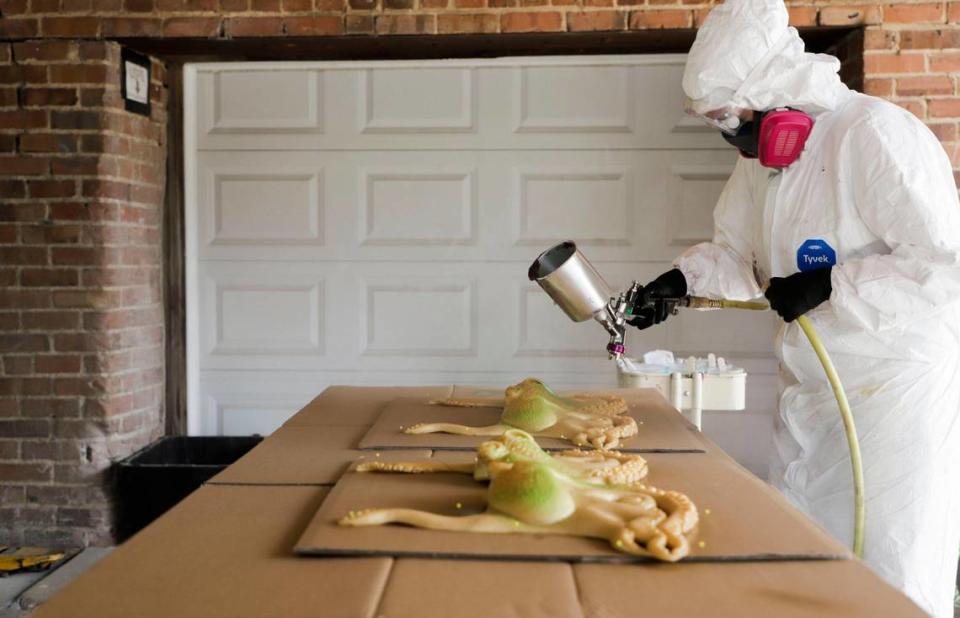
‘Leap without looking’
The two created Finfolk in 2013. Within a year and a half of starting the company they withdrew from college. Six months later, they were making enough money to quit their retail jobs to focus only on Finfolk.
Their custom, silicone tails became so coveted that counterfeit, fabric versions of their tails started appearing online.
They said they reached a point where they didn’t feel like they had an option other than to start making their own fabric tails, because there already was a market for them.
The sisters moved from Minnesota to the big island of Hawaii in 2014. But the island proved too remote to grow their business. So they looked for a new home and two years later, settled on North Carolina.
They bought the Lincolnton warehouse in 2017 to expand their operation and now have a team of eight employees.
Abby lives about 10 minutes away from the office in Lincolnton, about 40 minutes outside of Charlotte. Bryn lives 20 minutes away in Mount Holly, where her husband owns Seventh Sin Studio Company, a tattoo shop.
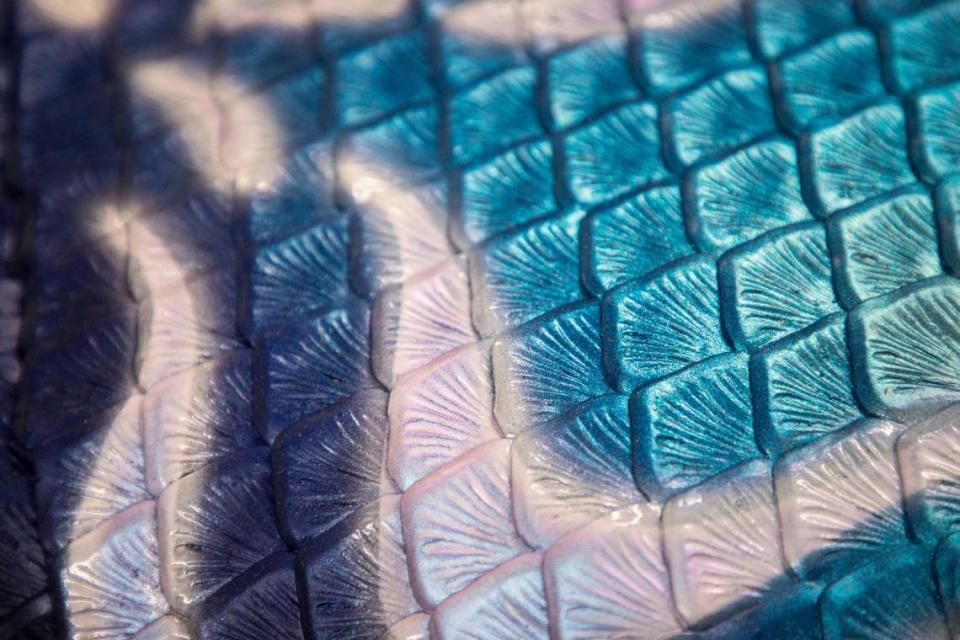
Finfolk fanfare
The mermaid business has treated the twins well.
Finfolk now brings in annual revenue in the seven figures, although the sisters declined to share exact numbers.
Their business model consists of four seasonal sales a year. Spring, summer, fall and Black Friday or Small Business Saturday sales offer a fixed number of tails that usually sell out within hours.
They also have a Tail of the Month, where one design is available all month for those who aren’t quick enough to secure a tail during the seasonal sales.
And Finfolk has a membership program called The Pod Squad. Customers can pay a one-time fee of $35, and are admitted into a private Facebook group, as well as one-hour early access to Tail of the Month and seasonal sales.
The Pod Squad has about 3,000 members, Abby said.
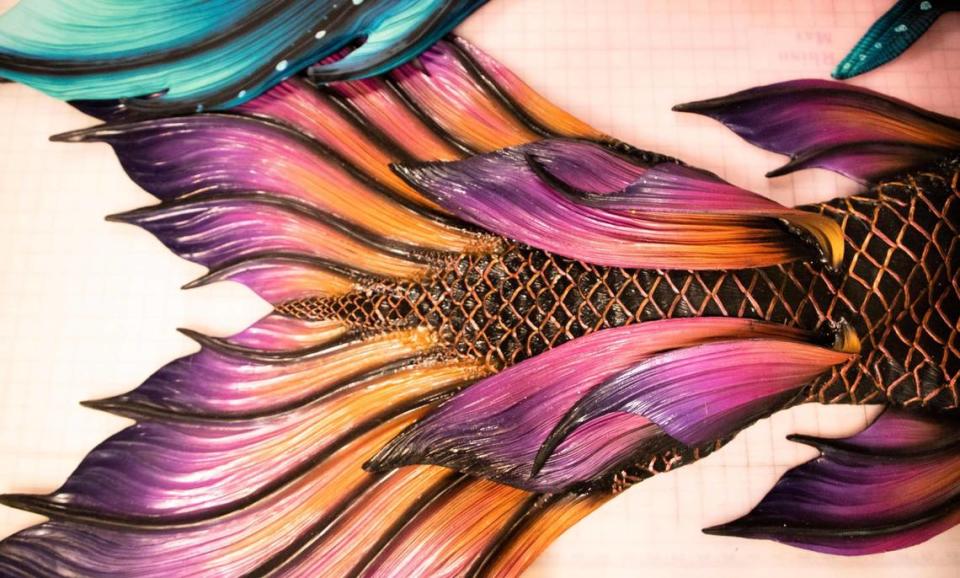
Price varies depending on customization, but the most inexpensive fabric tail starts at $220. And their most expensive is the silicone tail, which averages $5,500.
Finfolk’s silicone top sale went live in mid-June, offering 47 styles of tops ranging from $550 to $850. It sold out in seven minutes.
Monica Shakinovski from Cary has been performing as a mermaid at parties under the name Mermaid Amara for 10 years. She is a long-time customer of Finfolk and a member of the Pod Squad.
“There’s been a lot of chitchat in the (Facebook) group about, ‘Oh, I want to buy the Tail of the Month, but I want to see what the summer line is first, ... because you know, they’re not cheap,” she said.
Morgana Alba has performed as a mermaid under the name Mermaid Morgana for 13 years. She specializes in high-end events like casino shows, corporate parties and aquarium performances. Alba said Finfolk’s distinctive designs and painting techniques set them apart from other mermaid tail makers.
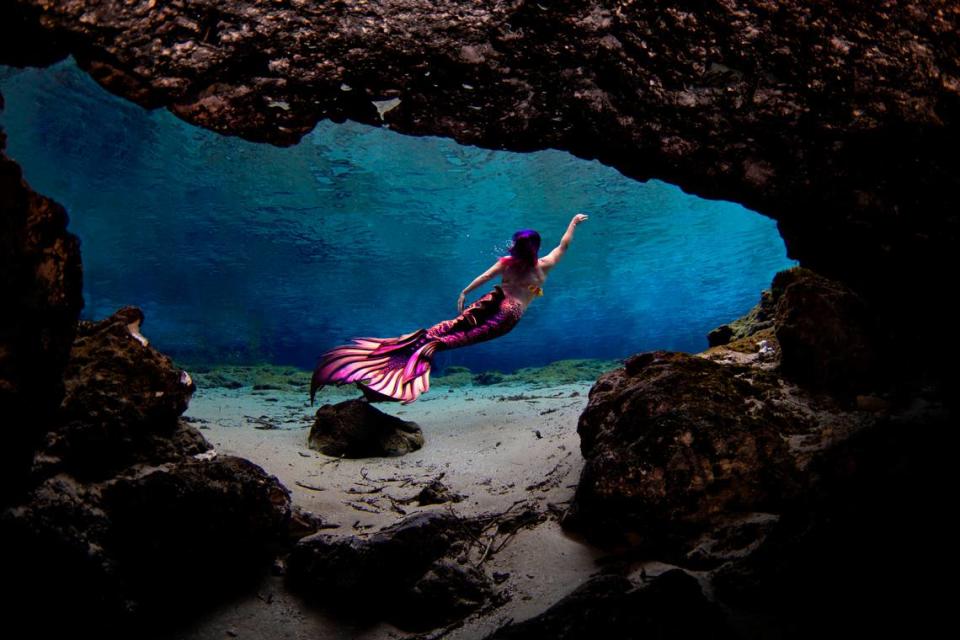
Being a professional mermaid
The industry the Roberts sisters found was small at the time, but has grown into an art form present in many cities, if you know where to look.
Alba manages her own mermaid performance group called Circus Siren Pod out of Washington, D.C. They have mermaid shows every year at Arizona, Pennsylvania and Carolina Renaissance Festivals, and travel around the country performing in aquarium tanks with live marine life.
Such shows consist of the mermaids showing off their underwater acrobatics, synchronized swimming and interacting with the audience through the glass.
Alba’s “pod” was featured in the Netflix documentary which came out May 23. Others in the documentary touted Circus Siren Pod as one of the most elite groups for mermaiding in the world.
Circus Siren mermaids, along with many others in the mermaiding field, are certified free divers, meaning they can hold their breath for three to five minutes. Alba said the tanks the mermaids swim in have high levels of salt to accommodate the marine life in them, which can burn people’s eyes and sinuses. They also risk hypothermia due to the cold water.
People think professional mermaids’ job is easy, she said, but it’s their job to make it look easy.
After hearing about Circus Siren Pod through Netflix, Sea Life aquarium in Concord Mills contacted Alba, requesting that Circus Siren Pod perform mermaid shows there.
Jasmine Jackson, admissions supervisor at Sea Life, said the attraction is not just for kids. “The kids are like, ‘Oh my god, like it’s a mermaid’ and they were excited,” Jackson said. “But some of the moms that came in, they were close to tears because it was so nice.”
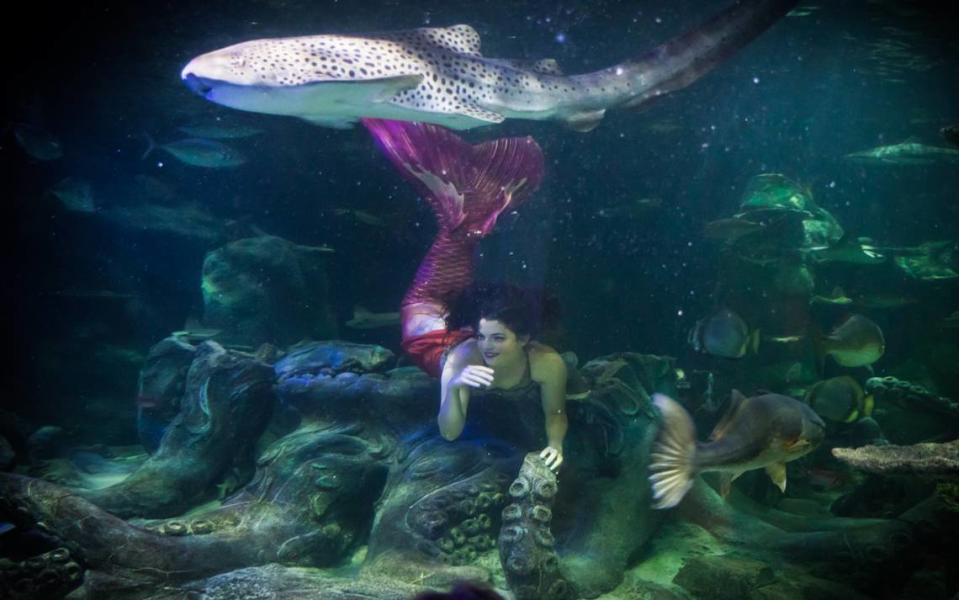
‘Mermaid summer’
Adults within the mermaiding space are Finfolk’s entire audience. They only sell adult tails.
Between the Netflix docu-series and “The Little Mermaid” remake, the mer-community is enjoying the spotlight during this, “mermaid summer,” as Bryn calls it.
The Roberts sisters took their staff to see “The Little Mermaid” on opening night, even though the twins were nervous about the film. They were concerned the association between the movie and their brand would negatively impact their sales if the movie did poorly. But they were pleasantly surprised by the film when they saw it.
Mermaiding is for everyone
Not only is the spotlight on mermaids this summer, but it’s also on diversity in mermaiding.
When “The Little Mermaid” cast was announced in 2019, some people pushed back against the casting of a Black actress, Halle Bailey, as Ariel. In the animated classic, Ariel was a white, red-headed singing mermaid.
But many others saw the casting as much needed representation for Black and brown children. Videos all over YouTube and Tik Tok show children’s delighted reactions to Bailey’s portrayal of Ariel in the movie’s trailer.
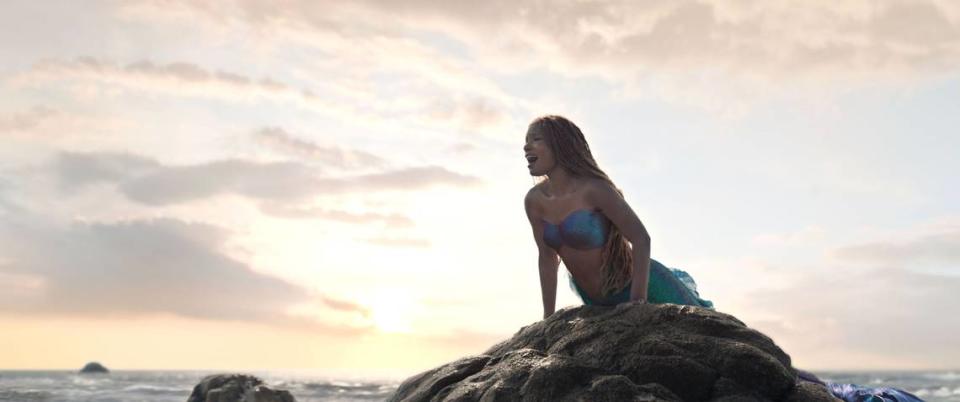
Many in the mermaiding community, including the Finfolk sisters and Alba, stress the importance of mermaiding remaining a safe space.
The docu-series follows groups like Afro Mermaids and the Society of Fat Mermaids speaking on the importance of representation.
“(Mermaiding has) this kind of fantastical, whimsical element of escapism,” Abby, said. “We’ve always had that mindset of everybody deserves to get to participate in that if they want to.”
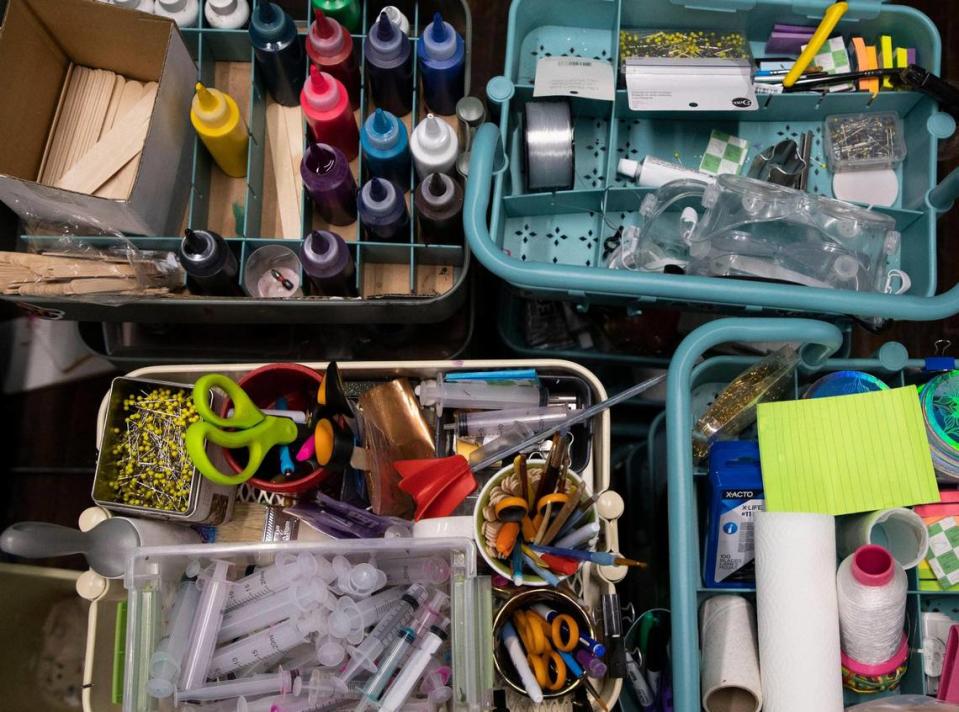
What’s next for Finfolk
Finfolk isn’t resting on the “mermaid summer” wave to carry them to more business.
They have plans to improve the inclusivity of their product line by including gender-neutral accessories. And they are expanding into the third floor of their office.
Among the floor-to-ceiling boxes of mermaid tails, fairy wings hung like picture frames and the wall-to-wall seascape mural painted by their father, the sisters still make time to appreciate how far they’ve come.
“She and I will have moments,” Bryn said, “sometimes it’ll be just the two of us in the building. And we’ll kind of look at each other and be like, ‘wow, this is real.’ ”

